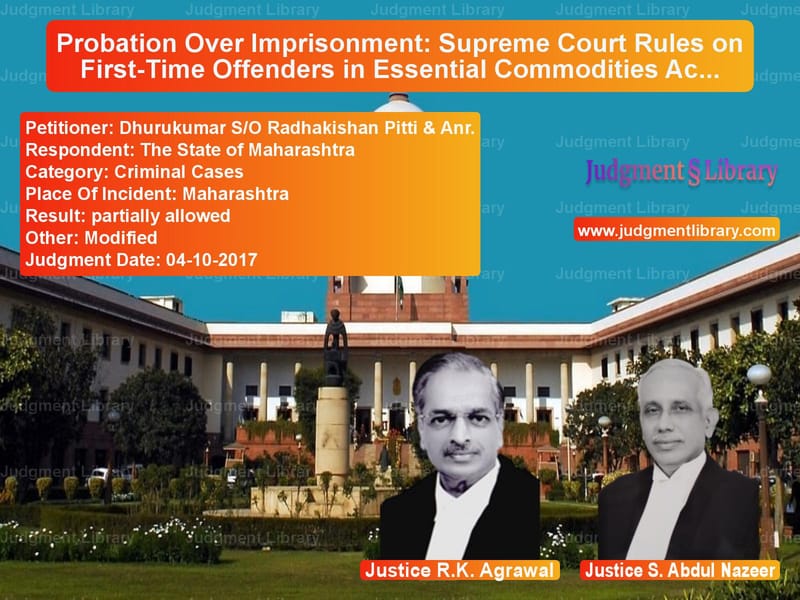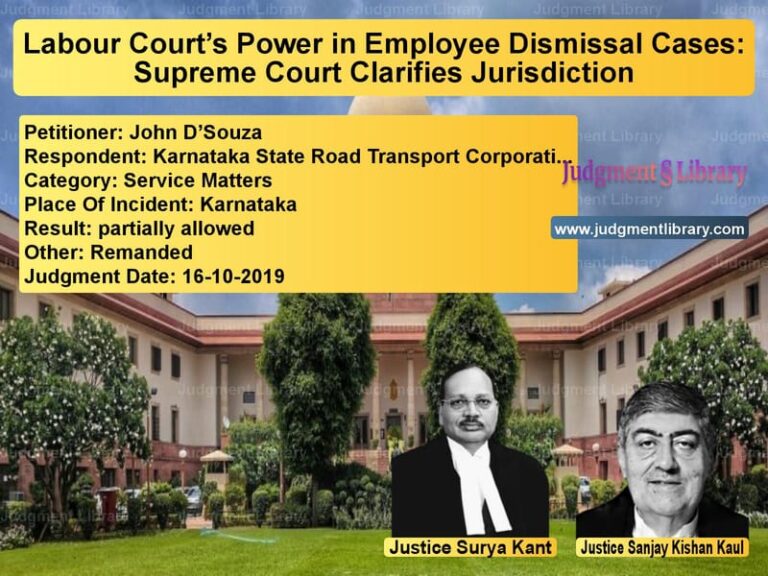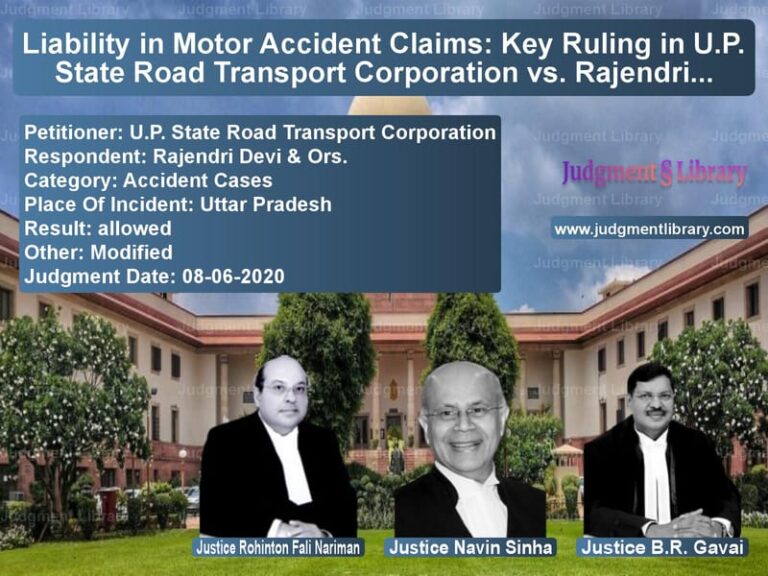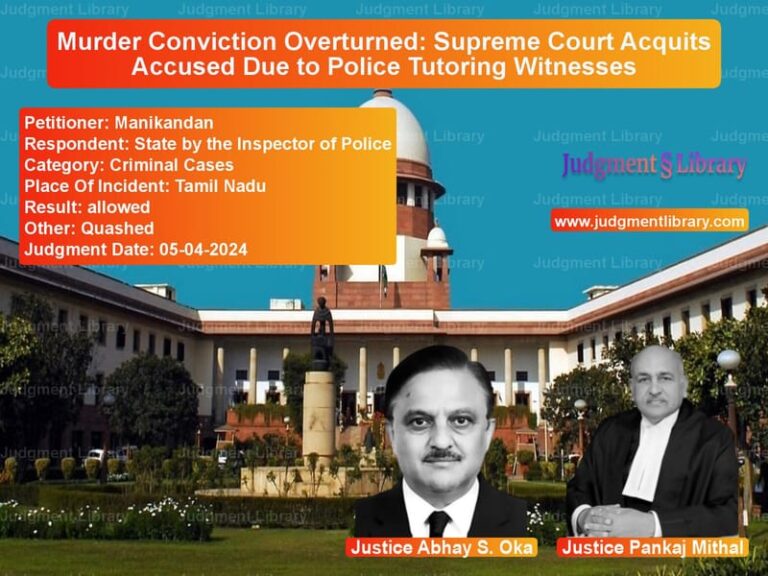Probation Over Imprisonment: Supreme Court Rules on First-Time Offenders in Essential Commodities Act Case
The Supreme Court of India recently delivered a crucial judgment in the case of Dhurukumar S/O Radhakishan Pitti & Anr. vs. The State of Maharashtra, dealing with the sentencing of first-time offenders convicted under the Essential Commodities Act, 1955. The case brought into focus the principles of criminal jurisprudence, particularly the application of probation for individuals with no prior criminal record.
The judgment revolved around whether the appellants, who had been sentenced to three months of rigorous imprisonment along with a fine, should be granted relief under Section 360 of the Code of Criminal Procedure, 1908, and the Probation of Offenders Act, 1958. The Court ultimately ruled in favor of probation, reinforcing the importance of rehabilitation over incarceration for first-time offenders.
Background of the Case
The appellants were convicted under Section 7 of the Essential Commodities Act, 1955, which penalizes violations related to essential goods and commodities. The trial court found them guilty and sentenced them to:
- Three months of rigorous imprisonment
- A fine of Rs. 500 each
- In case of default in payment of the fine, an additional imprisonment term of 15 days
The appellants appealed against this conviction, but the High Court upheld the trial court’s ruling. Dissatisfied with the decision, they approached the Supreme Court, seeking relief.
Arguments of the Appellants
The appellants argued before the Supreme Court that:
- They were first-time offenders with no previous criminal history.
- The sentence of imprisonment was too harsh given the nature of the offense.
- The Court should consider granting them the benefit of Section 360 of the CrPC, which allows for probation instead of imprisonment in cases where offenders have no prior convictions.
Arguments of the Respondent (State of Maharashtra)
The prosecution argued that:
- The conviction under Section 7 of the Essential Commodities Act was legally sound and should not be interfered with.
- The punishment imposed by the trial court was justified considering the importance of enforcing compliance with essential commodity regulations.
Supreme Court’s Ruling
The Supreme Court, after hearing both parties, upheld the conviction but modified the sentence by granting probation under Section 360 of the Code of Criminal Procedure, 1908. The Court ruled:
“It is true that the appellants do not have antecedents of offenders. Both of them are the first offenders. Having regard to the facts and circumstances of the case, we are of the view that the appellants should have been dealt with under Section 360 Cr.P.C. The ends of justice would be met by granting the benefit of Probation of Offenders Act, 1958 to the appellants.”
The Supreme Court further ordered:
- The conviction and fine imposed on the appellants would remain.
- The sentence of imprisonment was set aside.
- The trial court was directed to deal with the appellants under the Probation of Offenders Act.
Key Takeaways from the Judgment
This ruling reaffirmed several important legal principles:
- First-Time Offenders and Probation: The Supreme Court emphasized that first-time offenders should be given an opportunity for rehabilitation rather than incarceration.
- Balancing Justice and Leniency: While upholding the conviction, the Court ensured that the punishment was proportionate to the offense.
- Application of Section 360 Cr.P.C. and the Probation of Offenders Act: This case serves as a guiding precedent for applying probationary provisions for first-time offenders.
Legal Implications of the Judgment
This Supreme Court ruling has significant legal implications, particularly in cases involving economic offenses under special laws like the Essential Commodities Act. The judgment underscores the following:
- The judiciary’s inclination to adopt rehabilitative justice over punitive measures for first-time offenders.
- The reinforcement of judicial discretion in modifying sentences while ensuring justice.
- Setting a precedent for lower courts to consider probation as an alternative to imprisonment in appropriate cases.
Conclusion
The Supreme Court’s decision in Dhurukumar S/O Radhakishan Pitti & Anr. vs. The State of Maharashtra highlights the role of judicial discretion in sentencing. While maintaining the rule of law, the Court also recognized the importance of providing opportunities for reform. This ruling serves as an important precedent for first-time offenders, ensuring that justice is not only about punishment but also about fair opportunities for rehabilitation.
Don’t miss out on the full details! Download the complete judgment in PDF format below and gain valuable insights instantly!
Download Judgment: Dhurukumar SO Radha vs The State of Maharas Supreme Court of India Judgment Dated 04-10-2017.pdf
Direct Downlaod Judgment: Direct downlaod this Judgment
See all petitions in Bail and Anticipatory Bail
See all petitions in Fraud and Forgery
See all petitions in Money Laundering Cases
See all petitions in Judgment by R K Agrawal
See all petitions in Judgment by S. Abdul Nazeer
See all petitions in partially allowed
See all petitions in Modified
See all petitions in supreme court of India judgments October 2017
See all petitions in 2017 judgments
See all posts in Criminal Cases Category
See all allowed petitions in Criminal Cases Category
See all Dismissed petitions in Criminal Cases Category
See all partially allowed petitions in Criminal Cases Category







